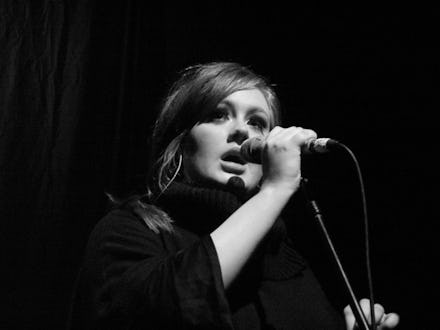What Every Generation's Favorite Artist Says About Them

In the 1950s, it was Elvis with "Hound Dog." In the '70s, it was Elton John with "Goodbye Yellow Brick Road." Every hit is obviously defined by the decade that produces it. That's because, it turns out, every decade is defined by its hits.
Just this week, a team of researchers at North Carolina State University released a study proving that you can predict a Billboard hit with 75% accuracy based on its lyrical themes.
That's because certain themes resonate closely with the generation of music buyers who are, by and large, young people. Every generation of young people chooses their favorite music based on their personality, making a generation's most popular artist the actual voice for that demographic. That means that the most popular music from each decade is a sort of time capsule for how the generation coming of age in that decade lived and felt.
This was also true for decades before Billboard. Based on the artists who sold the most records in each decade, here's how each generation's favorite artist came by their popularity:
1. 1940s: Bing Crosby
Bing Crosby's whole style of singing was a product of his time. Crooning, a gentle kind of singing, became popular in the '20s and '30s because singing loudly would blow early radio tubes.
By the middle of the 1940s, Bing Crosby perfected the style and his music was about as inoffensive and soft as is possible. This suited America's youth just fine. It was the war and America needed its teenagers to grow up quickly. That took the form of a bunch of youth-friendly legislation and even an unofficial bill of rights.
It also took the form of some pretty straight-laced young adults: The kind of kids who were really eager to get behind Crosby lines like, "If you hate to go to school / You may grow up to be a mule." Those are from "Swingin' On A Star." It was a hit. Kind of like "Dark Horse" is a hit.
2. 1950s: Elvis Presley
As the post-war image of teen conformity solidified, hormonal adolescents couldn't help but feel alienated. There was rebellion brewing among 1950s youth and it took the shape of movies like Rebel Without a Cause and, way more forcefully, Elvis.
So it makes sense that the most popular artist was a mama's boy who seemed totally unconsciously sexual. This generation got what he meant in "Hound Dog" when he sang, "You said you was high class / That was just a lie." It was true of them; it was true of him.
3. 1960s: The Beatles
A whole group of young people had their turbulent coming of age in turbulent times and the Beatles grew up right along with them. The most popular lyrics of this decade addressed the conflicting nostalgia and rebellion — it was a conflicted time.
Their biggest hit, the early "I Wanna Hold Your Hand," perfectly splits the difference. It's an anthem of open expression with the boys proudly singing, "It's such a feeling that my love / I can't hide." As they got druggier and wilder, so too did America's youth. But all the while, they retained that earnest openness as they promoted the power of love and the pointlessness of disillusionment.
4. 1970s: Elton John
The '70s carried over the '60s themes of "nostalgia" and "rebellion," but qualified them with an unfortunate "jaded." That's where Elton comes in.
"Goodbye Yellow Brick Road," the title of the most successful album by the most successful artist of the '70s. "So goodbye yellow brick road / Where the dogs of society howl," John sings. "You can't plant me in your penthouse / I'm going back to my plough." This is the sort of iconoclastic, rebellious music that hearkened back to harder bands from the '60s while looking forward to disco.
5. 1980s: Prince
The '80s were an era of one-hit wonders, which might say something about '80s kids' attention spans. But among many stars who came and went during the decade, the virtuosic Minnesotan Prince emerged as the most successful.
His biggest hit was Purple Rain's "When Doves Cry." It was hugely influential because its music video dominated the young MTV. But more tellingly, the '80s were one of the darker stories on the study of pop music. Apparently the top-performing songs of the generation were about "Loss, Aspiration, Confusion." That's a spot on description of Purple Rain.
6. 1990s: Mariah Carey
"It's just a sweet, sweet fantasy, baby," Mariah Carey sings on one of her many hits of the '90s. Sure, there was plenty of angsty teen spirit to go around in the underground's grunge movement of the time, but the majority of this decade's youth opted for Carey's daydreams. In fact, one of the most popular themes of the decade was "escapism" — a response to the confusion of the previous decade.
On the plus side, though, she's the first woman to rule a decade.
7. 2000s: Eminem
In their study, the North Carolina researchers found that hits in the early 2000s were mostly about inspiration, pain and desperation. No rapper embodied those values better than Eminem.
Seconds into "Lose Yourself," his massive, aggressively-delivered hit, it's clear that Eminem is hungrier for fame than most of his predecessors. That was the story made famous by 8 Mile, but even his inspiring story came with its share of serious hardship. His aggression as well as his rags-to-riches trajectory embodied the ethos of the first generation truly raised on mainstream hip-hop.
8. 2010s: Adele?
The decade isn't over yet, but if Adele's dominance means anything so far, it might be that those who complain of youth apathy have nothing to worry about.
Either way, Adele's popularity signals a broad shift towards female pop stars. One way or another, this generation will be remembered as an open one. And we can be proud of that.